Analysis of Executive Incentives and Corporate Governance Mechanisms
VerifiedAdded on 2020/06/04
|8
|2479
|271
Report
AI Summary
This report delves into the critical relationship between executive incentives and corporate governance, exploring the application of agency theory to evaluate incentive mechanisms. The report begins by outlining agency theory, describing the principal-agent relationship and its implications for aligning executive and shareholder interests. It then describes the creation of executive incentive mechanisms, referencing the Xerox case to highlight potential pitfalls, such as accounting-based incentives that may encourage short-term profit manipulation. The analysis critically evaluates the roles and effectiveness of various incentive mechanisms, including salary, bonuses, and stock options, using both ex-post and ex-ante evidence. It examines the potential for conflicts of interest, using the Disney case study to illustrate the complexities of incentive systems and their impact on firm performance and shareholder value. The report concludes by summarizing key findings and offering recommendations for improving executive incentive practices to enhance corporate governance and promote long-term value creation. The report highlights the need for careful consideration of incentive design to avoid unintended consequences and ensure alignment with stakeholder interests.
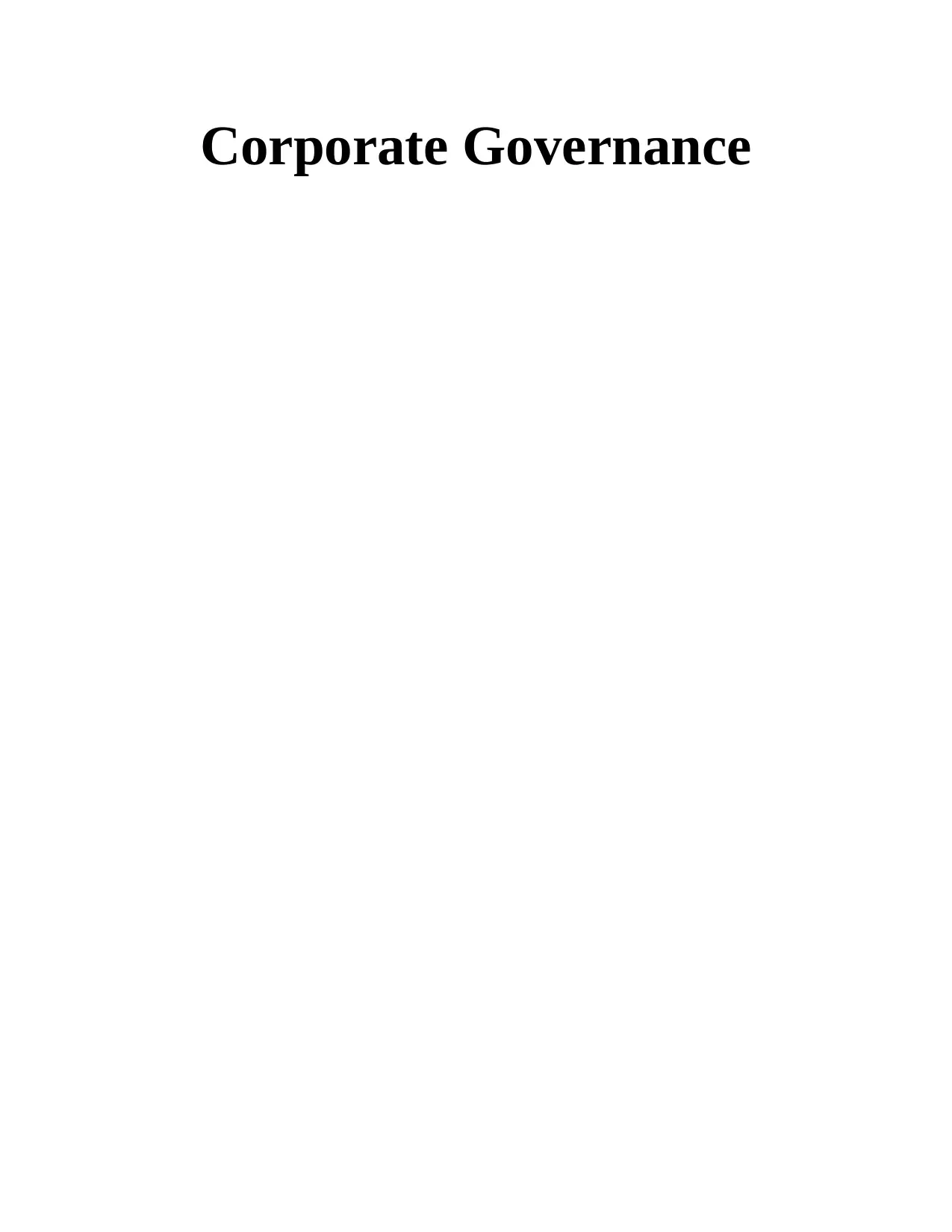
Corporate Governance
Paraphrase This Document
Need a fresh take? Get an instant paraphrase of this document with our AI Paraphraser
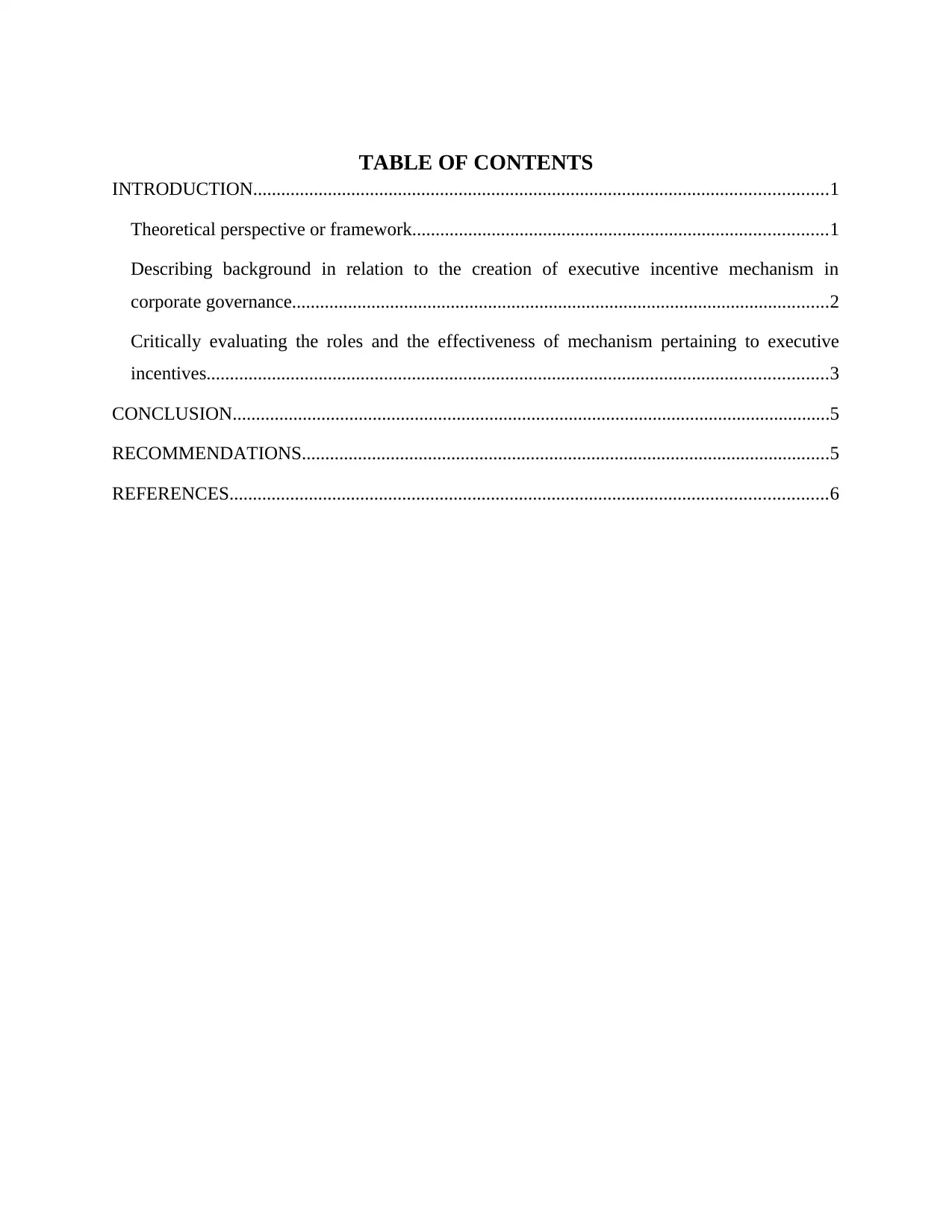
TABLE OF CONTENTS
INTRODUCTION...........................................................................................................................1
Theoretical perspective or framework.........................................................................................1
Describing background in relation to the creation of executive incentive mechanism in
corporate governance...................................................................................................................2
Critically evaluating the roles and the effectiveness of mechanism pertaining to executive
incentives.....................................................................................................................................3
CONCLUSION................................................................................................................................5
RECOMMENDATIONS.................................................................................................................5
REFERENCES................................................................................................................................6
INTRODUCTION...........................................................................................................................1
Theoretical perspective or framework.........................................................................................1
Describing background in relation to the creation of executive incentive mechanism in
corporate governance...................................................................................................................2
Critically evaluating the roles and the effectiveness of mechanism pertaining to executive
incentives.....................................................................................................................................3
CONCLUSION................................................................................................................................5
RECOMMENDATIONS.................................................................................................................5
REFERENCES................................................................................................................................6
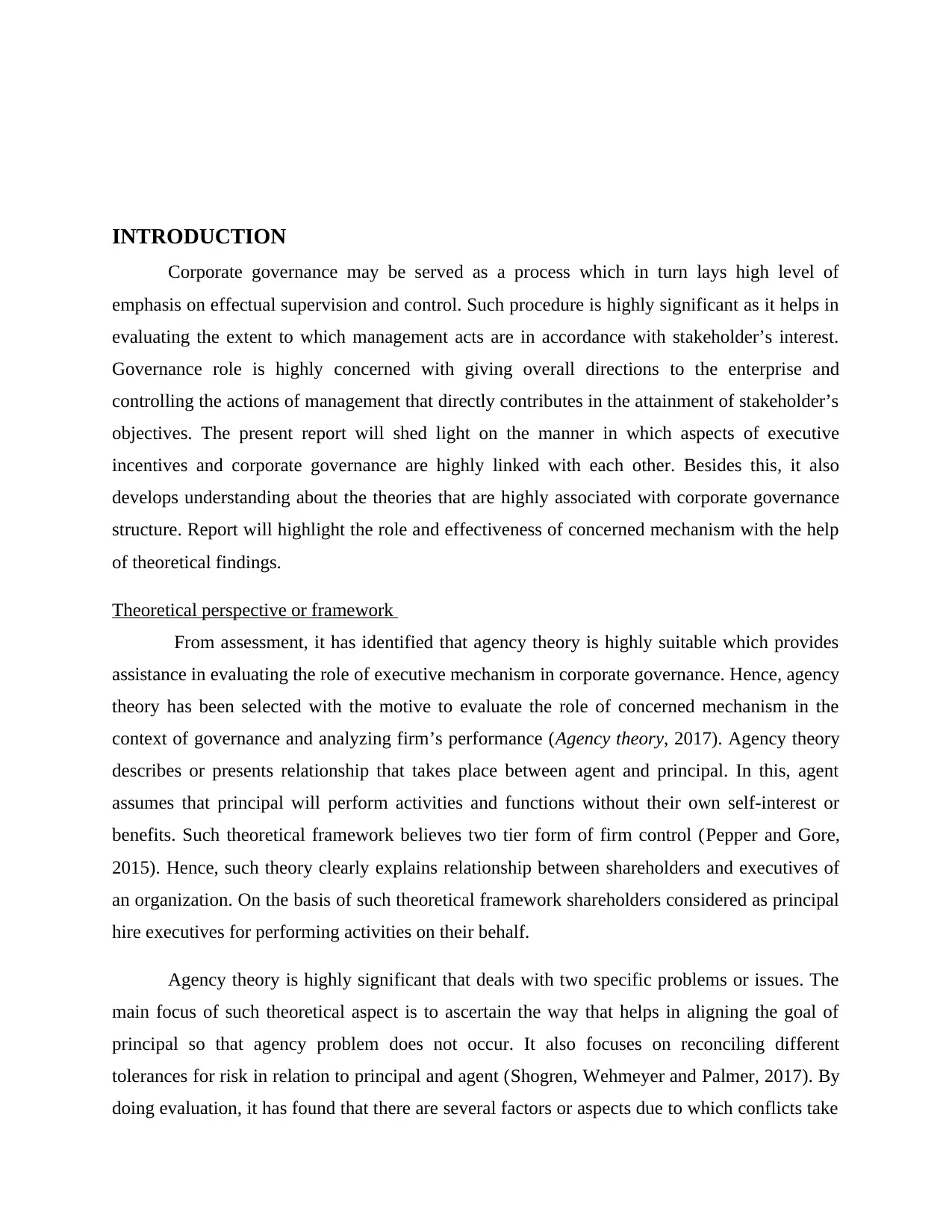
INTRODUCTION
Corporate governance may be served as a process which in turn lays high level of
emphasis on effectual supervision and control. Such procedure is highly significant as it helps in
evaluating the extent to which management acts are in accordance with stakeholder’s interest.
Governance role is highly concerned with giving overall directions to the enterprise and
controlling the actions of management that directly contributes in the attainment of stakeholder’s
objectives. The present report will shed light on the manner in which aspects of executive
incentives and corporate governance are highly linked with each other. Besides this, it also
develops understanding about the theories that are highly associated with corporate governance
structure. Report will highlight the role and effectiveness of concerned mechanism with the help
of theoretical findings.
Theoretical perspective or framework
From assessment, it has identified that agency theory is highly suitable which provides
assistance in evaluating the role of executive mechanism in corporate governance. Hence, agency
theory has been selected with the motive to evaluate the role of concerned mechanism in the
context of governance and analyzing firm’s performance (Agency theory, 2017). Agency theory
describes or presents relationship that takes place between agent and principal. In this, agent
assumes that principal will perform activities and functions without their own self-interest or
benefits. Such theoretical framework believes two tier form of firm control (Pepper and Gore,
2015). Hence, such theory clearly explains relationship between shareholders and executives of
an organization. On the basis of such theoretical framework shareholders considered as principal
hire executives for performing activities on their behalf.
Agency theory is highly significant that deals with two specific problems or issues. The
main focus of such theoretical aspect is to ascertain the way that helps in aligning the goal of
principal so that agency problem does not occur. It also focuses on reconciling different
tolerances for risk in relation to principal and agent (Shogren, Wehmeyer and Palmer, 2017). By
doing evaluation, it has found that there are several factors or aspects due to which conflicts take
Corporate governance may be served as a process which in turn lays high level of
emphasis on effectual supervision and control. Such procedure is highly significant as it helps in
evaluating the extent to which management acts are in accordance with stakeholder’s interest.
Governance role is highly concerned with giving overall directions to the enterprise and
controlling the actions of management that directly contributes in the attainment of stakeholder’s
objectives. The present report will shed light on the manner in which aspects of executive
incentives and corporate governance are highly linked with each other. Besides this, it also
develops understanding about the theories that are highly associated with corporate governance
structure. Report will highlight the role and effectiveness of concerned mechanism with the help
of theoretical findings.
Theoretical perspective or framework
From assessment, it has identified that agency theory is highly suitable which provides
assistance in evaluating the role of executive mechanism in corporate governance. Hence, agency
theory has been selected with the motive to evaluate the role of concerned mechanism in the
context of governance and analyzing firm’s performance (Agency theory, 2017). Agency theory
describes or presents relationship that takes place between agent and principal. In this, agent
assumes that principal will perform activities and functions without their own self-interest or
benefits. Such theoretical framework believes two tier form of firm control (Pepper and Gore,
2015). Hence, such theory clearly explains relationship between shareholders and executives of
an organization. On the basis of such theoretical framework shareholders considered as principal
hire executives for performing activities on their behalf.
Agency theory is highly significant that deals with two specific problems or issues. The
main focus of such theoretical aspect is to ascertain the way that helps in aligning the goal of
principal so that agency problem does not occur. It also focuses on reconciling different
tolerances for risk in relation to principal and agent (Shogren, Wehmeyer and Palmer, 2017). By
doing evaluation, it has found that there are several factors or aspects due to which conflicts take
⊘ This is a preview!⊘
Do you want full access?
Subscribe today to unlock all pages.

Trusted by 1+ million students worldwide
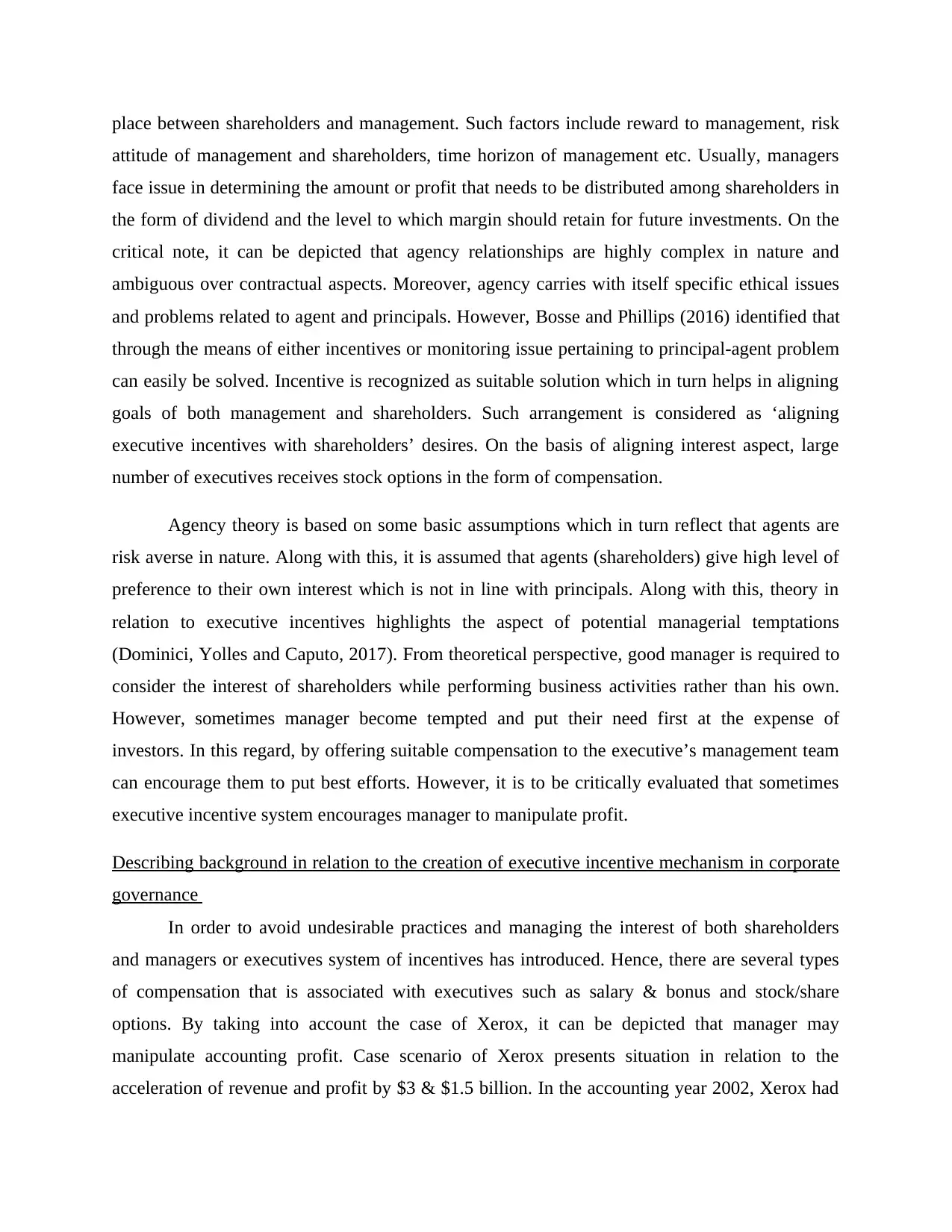
place between shareholders and management. Such factors include reward to management, risk
attitude of management and shareholders, time horizon of management etc. Usually, managers
face issue in determining the amount or profit that needs to be distributed among shareholders in
the form of dividend and the level to which margin should retain for future investments. On the
critical note, it can be depicted that agency relationships are highly complex in nature and
ambiguous over contractual aspects. Moreover, agency carries with itself specific ethical issues
and problems related to agent and principals. However, Bosse and Phillips (2016) identified that
through the means of either incentives or monitoring issue pertaining to principal-agent problem
can easily be solved. Incentive is recognized as suitable solution which in turn helps in aligning
goals of both management and shareholders. Such arrangement is considered as ‘aligning
executive incentives with shareholders’ desires. On the basis of aligning interest aspect, large
number of executives receives stock options in the form of compensation.
Agency theory is based on some basic assumptions which in turn reflect that agents are
risk averse in nature. Along with this, it is assumed that agents (shareholders) give high level of
preference to their own interest which is not in line with principals. Along with this, theory in
relation to executive incentives highlights the aspect of potential managerial temptations
(Dominici, Yolles and Caputo, 2017). From theoretical perspective, good manager is required to
consider the interest of shareholders while performing business activities rather than his own.
However, sometimes manager become tempted and put their need first at the expense of
investors. In this regard, by offering suitable compensation to the executive’s management team
can encourage them to put best efforts. However, it is to be critically evaluated that sometimes
executive incentive system encourages manager to manipulate profit.
Describing background in relation to the creation of executive incentive mechanism in corporate
governance
In order to avoid undesirable practices and managing the interest of both shareholders
and managers or executives system of incentives has introduced. Hence, there are several types
of compensation that is associated with executives such as salary & bonus and stock/share
options. By taking into account the case of Xerox, it can be depicted that manager may
manipulate accounting profit. Case scenario of Xerox presents situation in relation to the
acceleration of revenue and profit by $3 & $1.5 billion. In the accounting year 2002, Xerox had
attitude of management and shareholders, time horizon of management etc. Usually, managers
face issue in determining the amount or profit that needs to be distributed among shareholders in
the form of dividend and the level to which margin should retain for future investments. On the
critical note, it can be depicted that agency relationships are highly complex in nature and
ambiguous over contractual aspects. Moreover, agency carries with itself specific ethical issues
and problems related to agent and principals. However, Bosse and Phillips (2016) identified that
through the means of either incentives or monitoring issue pertaining to principal-agent problem
can easily be solved. Incentive is recognized as suitable solution which in turn helps in aligning
goals of both management and shareholders. Such arrangement is considered as ‘aligning
executive incentives with shareholders’ desires. On the basis of aligning interest aspect, large
number of executives receives stock options in the form of compensation.
Agency theory is based on some basic assumptions which in turn reflect that agents are
risk averse in nature. Along with this, it is assumed that agents (shareholders) give high level of
preference to their own interest which is not in line with principals. Along with this, theory in
relation to executive incentives highlights the aspect of potential managerial temptations
(Dominici, Yolles and Caputo, 2017). From theoretical perspective, good manager is required to
consider the interest of shareholders while performing business activities rather than his own.
However, sometimes manager become tempted and put their need first at the expense of
investors. In this regard, by offering suitable compensation to the executive’s management team
can encourage them to put best efforts. However, it is to be critically evaluated that sometimes
executive incentive system encourages manager to manipulate profit.
Describing background in relation to the creation of executive incentive mechanism in corporate
governance
In order to avoid undesirable practices and managing the interest of both shareholders
and managers or executives system of incentives has introduced. Hence, there are several types
of compensation that is associated with executives such as salary & bonus and stock/share
options. By taking into account the case of Xerox, it can be depicted that manager may
manipulate accounting profit. Case scenario of Xerox presents situation in relation to the
acceleration of revenue and profit by $3 & $1.5 billion. In the accounting year 2002, Xerox had
Paraphrase This Document
Need a fresh take? Get an instant paraphrase of this document with our AI Paraphraser
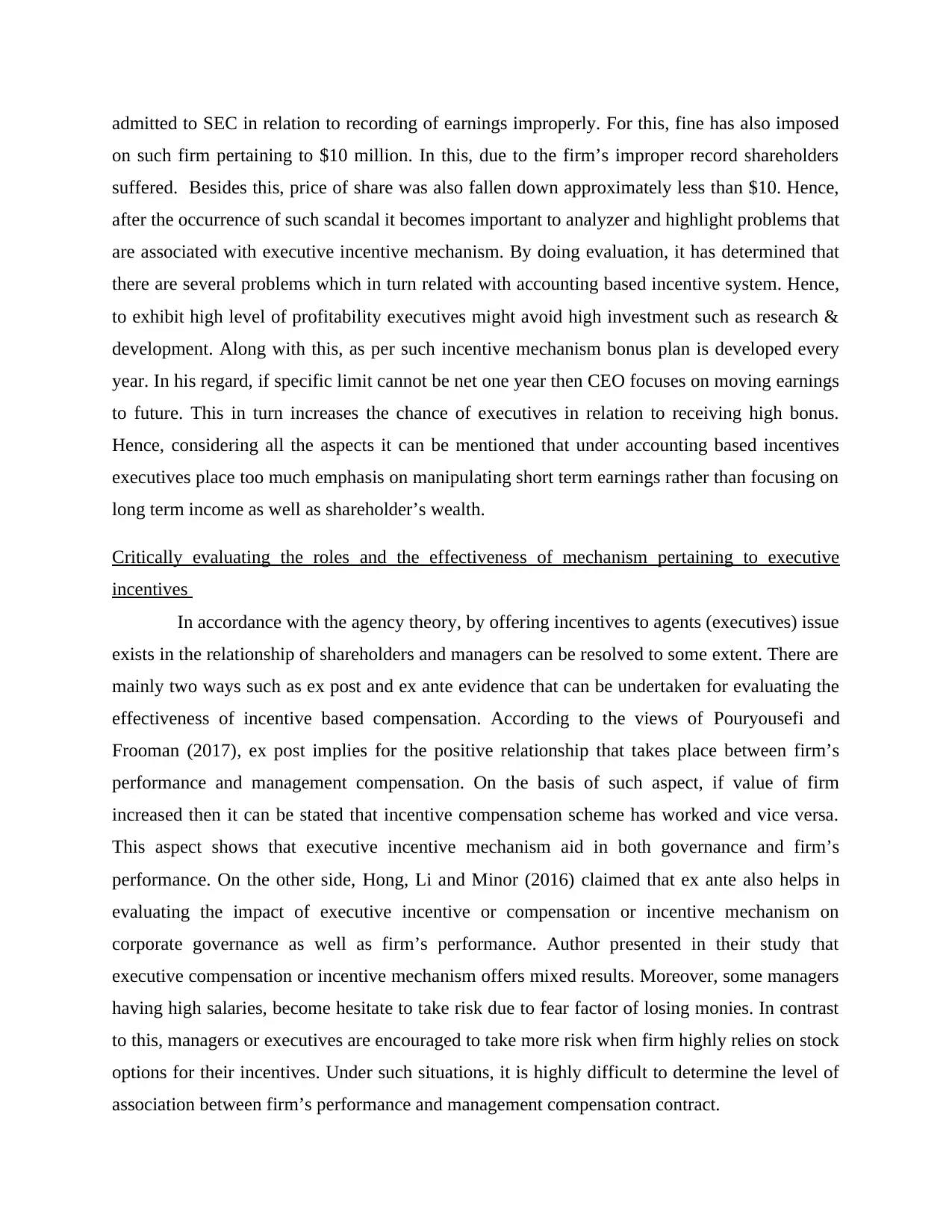
admitted to SEC in relation to recording of earnings improperly. For this, fine has also imposed
on such firm pertaining to $10 million. In this, due to the firm’s improper record shareholders
suffered. Besides this, price of share was also fallen down approximately less than $10. Hence,
after the occurrence of such scandal it becomes important to analyzer and highlight problems that
are associated with executive incentive mechanism. By doing evaluation, it has determined that
there are several problems which in turn related with accounting based incentive system. Hence,
to exhibit high level of profitability executives might avoid high investment such as research &
development. Along with this, as per such incentive mechanism bonus plan is developed every
year. In his regard, if specific limit cannot be net one year then CEO focuses on moving earnings
to future. This in turn increases the chance of executives in relation to receiving high bonus.
Hence, considering all the aspects it can be mentioned that under accounting based incentives
executives place too much emphasis on manipulating short term earnings rather than focusing on
long term income as well as shareholder’s wealth.
Critically evaluating the roles and the effectiveness of mechanism pertaining to executive
incentives
In accordance with the agency theory, by offering incentives to agents (executives) issue
exists in the relationship of shareholders and managers can be resolved to some extent. There are
mainly two ways such as ex post and ex ante evidence that can be undertaken for evaluating the
effectiveness of incentive based compensation. According to the views of Pouryousefi and
Frooman (2017), ex post implies for the positive relationship that takes place between firm’s
performance and management compensation. On the basis of such aspect, if value of firm
increased then it can be stated that incentive compensation scheme has worked and vice versa.
This aspect shows that executive incentive mechanism aid in both governance and firm’s
performance. On the other side, Hong, Li and Minor (2016) claimed that ex ante also helps in
evaluating the impact of executive incentive or compensation or incentive mechanism on
corporate governance as well as firm’s performance. Author presented in their study that
executive compensation or incentive mechanism offers mixed results. Moreover, some managers
having high salaries, become hesitate to take risk due to fear factor of losing monies. In contrast
to this, managers or executives are encouraged to take more risk when firm highly relies on stock
options for their incentives. Under such situations, it is highly difficult to determine the level of
association between firm’s performance and management compensation contract.
on such firm pertaining to $10 million. In this, due to the firm’s improper record shareholders
suffered. Besides this, price of share was also fallen down approximately less than $10. Hence,
after the occurrence of such scandal it becomes important to analyzer and highlight problems that
are associated with executive incentive mechanism. By doing evaluation, it has determined that
there are several problems which in turn related with accounting based incentive system. Hence,
to exhibit high level of profitability executives might avoid high investment such as research &
development. Along with this, as per such incentive mechanism bonus plan is developed every
year. In his regard, if specific limit cannot be net one year then CEO focuses on moving earnings
to future. This in turn increases the chance of executives in relation to receiving high bonus.
Hence, considering all the aspects it can be mentioned that under accounting based incentives
executives place too much emphasis on manipulating short term earnings rather than focusing on
long term income as well as shareholder’s wealth.
Critically evaluating the roles and the effectiveness of mechanism pertaining to executive
incentives
In accordance with the agency theory, by offering incentives to agents (executives) issue
exists in the relationship of shareholders and managers can be resolved to some extent. There are
mainly two ways such as ex post and ex ante evidence that can be undertaken for evaluating the
effectiveness of incentive based compensation. According to the views of Pouryousefi and
Frooman (2017), ex post implies for the positive relationship that takes place between firm’s
performance and management compensation. On the basis of such aspect, if value of firm
increased then it can be stated that incentive compensation scheme has worked and vice versa.
This aspect shows that executive incentive mechanism aid in both governance and firm’s
performance. On the other side, Hong, Li and Minor (2016) claimed that ex ante also helps in
evaluating the impact of executive incentive or compensation or incentive mechanism on
corporate governance as well as firm’s performance. Author presented in their study that
executive compensation or incentive mechanism offers mixed results. Moreover, some managers
having high salaries, become hesitate to take risk due to fear factor of losing monies. In contrast
to this, managers or executives are encouraged to take more risk when firm highly relies on stock
options for their incentives. Under such situations, it is highly difficult to determine the level of
association between firm’s performance and management compensation contract.
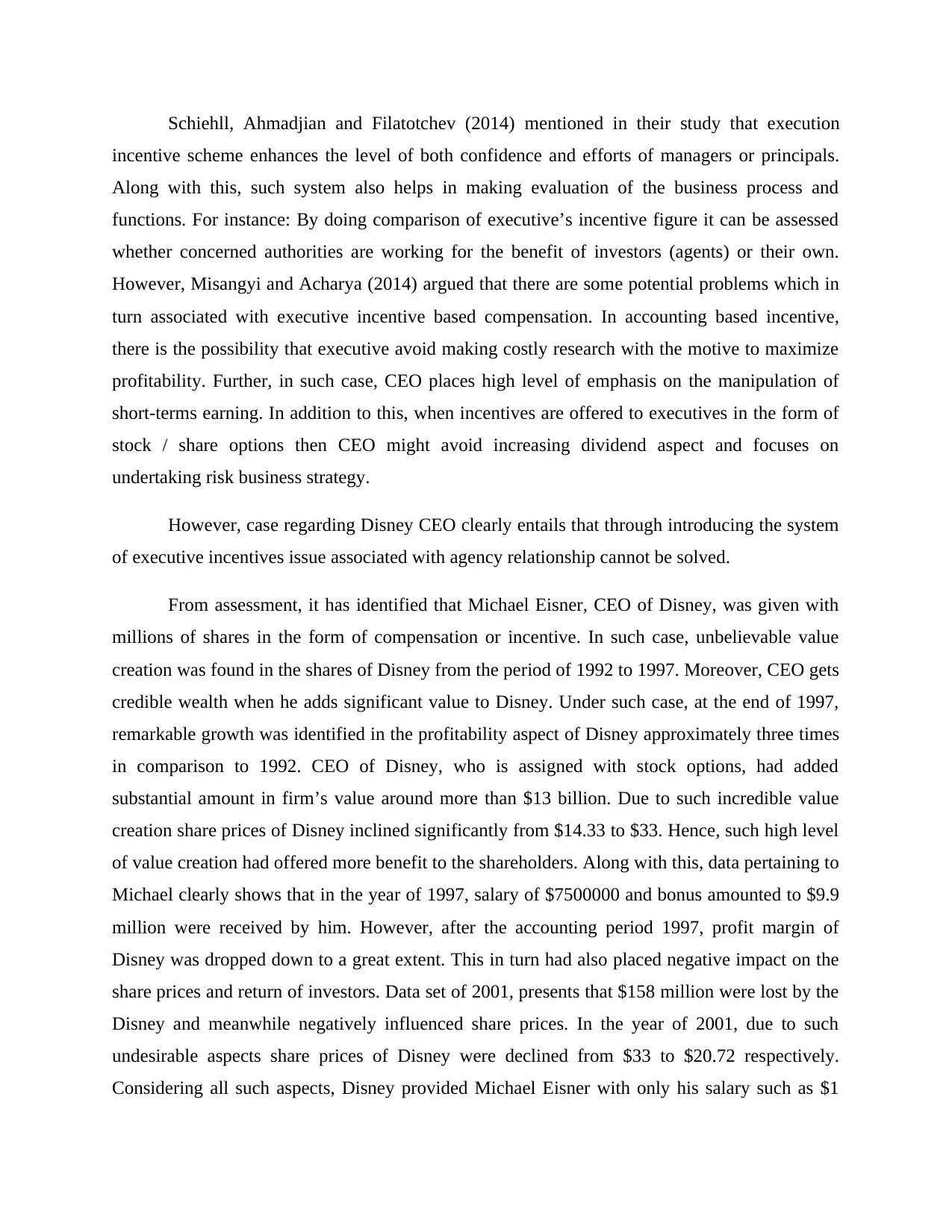
Schiehll, Ahmadjian and Filatotchev (2014) mentioned in their study that execution
incentive scheme enhances the level of both confidence and efforts of managers or principals.
Along with this, such system also helps in making evaluation of the business process and
functions. For instance: By doing comparison of executive’s incentive figure it can be assessed
whether concerned authorities are working for the benefit of investors (agents) or their own.
However, Misangyi and Acharya (2014) argued that there are some potential problems which in
turn associated with executive incentive based compensation. In accounting based incentive,
there is the possibility that executive avoid making costly research with the motive to maximize
profitability. Further, in such case, CEO places high level of emphasis on the manipulation of
short-terms earning. In addition to this, when incentives are offered to executives in the form of
stock / share options then CEO might avoid increasing dividend aspect and focuses on
undertaking risk business strategy.
However, case regarding Disney CEO clearly entails that through introducing the system
of executive incentives issue associated with agency relationship cannot be solved.
From assessment, it has identified that Michael Eisner, CEO of Disney, was given with
millions of shares in the form of compensation or incentive. In such case, unbelievable value
creation was found in the shares of Disney from the period of 1992 to 1997. Moreover, CEO gets
credible wealth when he adds significant value to Disney. Under such case, at the end of 1997,
remarkable growth was identified in the profitability aspect of Disney approximately three times
in comparison to 1992. CEO of Disney, who is assigned with stock options, had added
substantial amount in firm’s value around more than $13 billion. Due to such incredible value
creation share prices of Disney inclined significantly from $14.33 to $33. Hence, such high level
of value creation had offered more benefit to the shareholders. Along with this, data pertaining to
Michael clearly shows that in the year of 1997, salary of $7500000 and bonus amounted to $9.9
million were received by him. However, after the accounting period 1997, profit margin of
Disney was dropped down to a great extent. This in turn had also placed negative impact on the
share prices and return of investors. Data set of 2001, presents that $158 million were lost by the
Disney and meanwhile negatively influenced share prices. In the year of 2001, due to such
undesirable aspects share prices of Disney were declined from $33 to $20.72 respectively.
Considering all such aspects, Disney provided Michael Eisner with only his salary such as $1
incentive scheme enhances the level of both confidence and efforts of managers or principals.
Along with this, such system also helps in making evaluation of the business process and
functions. For instance: By doing comparison of executive’s incentive figure it can be assessed
whether concerned authorities are working for the benefit of investors (agents) or their own.
However, Misangyi and Acharya (2014) argued that there are some potential problems which in
turn associated with executive incentive based compensation. In accounting based incentive,
there is the possibility that executive avoid making costly research with the motive to maximize
profitability. Further, in such case, CEO places high level of emphasis on the manipulation of
short-terms earning. In addition to this, when incentives are offered to executives in the form of
stock / share options then CEO might avoid increasing dividend aspect and focuses on
undertaking risk business strategy.
However, case regarding Disney CEO clearly entails that through introducing the system
of executive incentives issue associated with agency relationship cannot be solved.
From assessment, it has identified that Michael Eisner, CEO of Disney, was given with
millions of shares in the form of compensation or incentive. In such case, unbelievable value
creation was found in the shares of Disney from the period of 1992 to 1997. Moreover, CEO gets
credible wealth when he adds significant value to Disney. Under such case, at the end of 1997,
remarkable growth was identified in the profitability aspect of Disney approximately three times
in comparison to 1992. CEO of Disney, who is assigned with stock options, had added
substantial amount in firm’s value around more than $13 billion. Due to such incredible value
creation share prices of Disney inclined significantly from $14.33 to $33. Hence, such high level
of value creation had offered more benefit to the shareholders. Along with this, data pertaining to
Michael clearly shows that in the year of 1997, salary of $7500000 and bonus amounted to $9.9
million were received by him. However, after the accounting period 1997, profit margin of
Disney was dropped down to a great extent. This in turn had also placed negative impact on the
share prices and return of investors. Data set of 2001, presents that $158 million were lost by the
Disney and meanwhile negatively influenced share prices. In the year of 2001, due to such
undesirable aspects share prices of Disney were declined from $33 to $20.72 respectively.
Considering all such aspects, Disney provided Michael Eisner with only his salary such as $1
⊘ This is a preview!⊘
Do you want full access?
Subscribe today to unlock all pages.

Trusted by 1+ million students worldwide
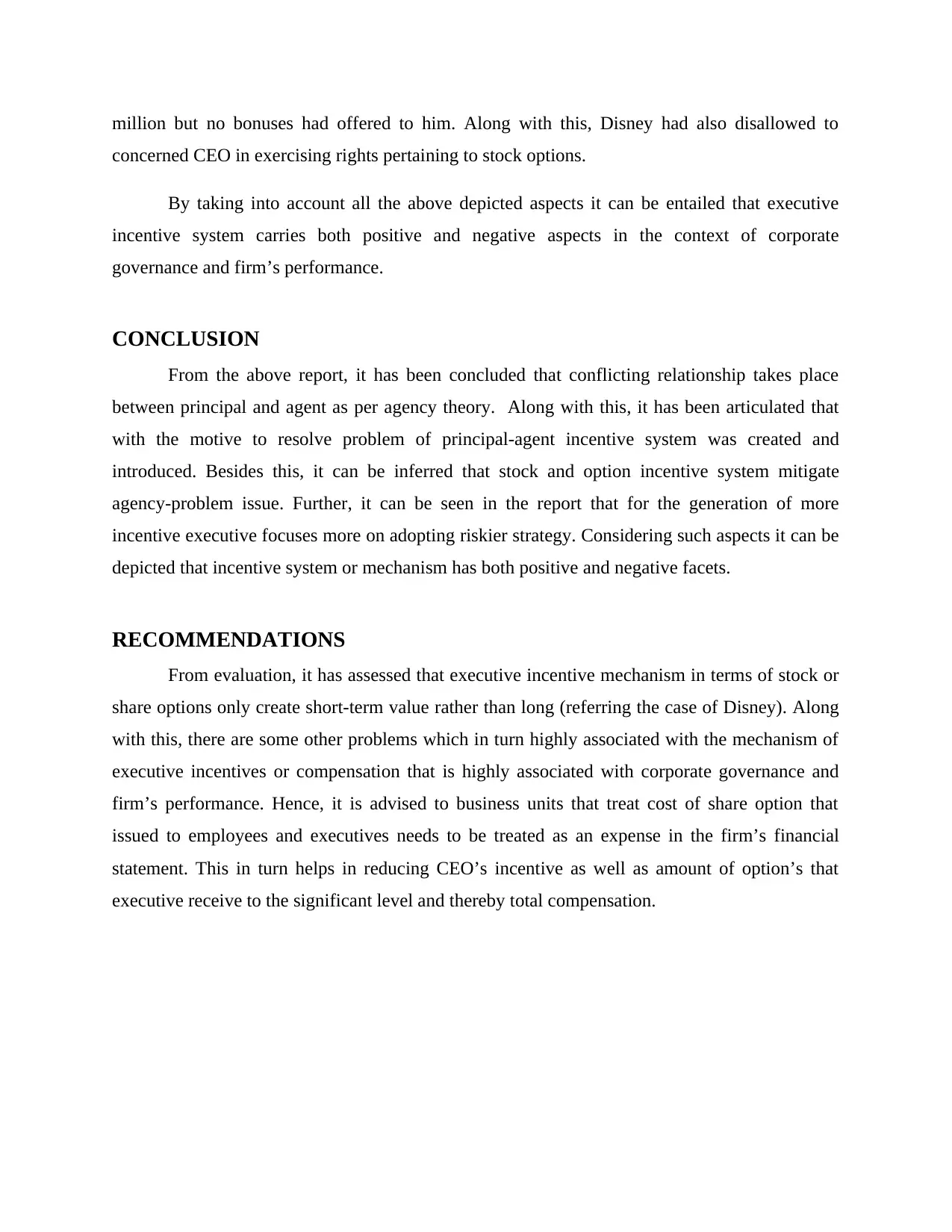
million but no bonuses had offered to him. Along with this, Disney had also disallowed to
concerned CEO in exercising rights pertaining to stock options.
By taking into account all the above depicted aspects it can be entailed that executive
incentive system carries both positive and negative aspects in the context of corporate
governance and firm’s performance.
CONCLUSION
From the above report, it has been concluded that conflicting relationship takes place
between principal and agent as per agency theory. Along with this, it has been articulated that
with the motive to resolve problem of principal-agent incentive system was created and
introduced. Besides this, it can be inferred that stock and option incentive system mitigate
agency-problem issue. Further, it can be seen in the report that for the generation of more
incentive executive focuses more on adopting riskier strategy. Considering such aspects it can be
depicted that incentive system or mechanism has both positive and negative facets.
RECOMMENDATIONS
From evaluation, it has assessed that executive incentive mechanism in terms of stock or
share options only create short-term value rather than long (referring the case of Disney). Along
with this, there are some other problems which in turn highly associated with the mechanism of
executive incentives or compensation that is highly associated with corporate governance and
firm’s performance. Hence, it is advised to business units that treat cost of share option that
issued to employees and executives needs to be treated as an expense in the firm’s financial
statement. This in turn helps in reducing CEO’s incentive as well as amount of option’s that
executive receive to the significant level and thereby total compensation.
concerned CEO in exercising rights pertaining to stock options.
By taking into account all the above depicted aspects it can be entailed that executive
incentive system carries both positive and negative aspects in the context of corporate
governance and firm’s performance.
CONCLUSION
From the above report, it has been concluded that conflicting relationship takes place
between principal and agent as per agency theory. Along with this, it has been articulated that
with the motive to resolve problem of principal-agent incentive system was created and
introduced. Besides this, it can be inferred that stock and option incentive system mitigate
agency-problem issue. Further, it can be seen in the report that for the generation of more
incentive executive focuses more on adopting riskier strategy. Considering such aspects it can be
depicted that incentive system or mechanism has both positive and negative facets.
RECOMMENDATIONS
From evaluation, it has assessed that executive incentive mechanism in terms of stock or
share options only create short-term value rather than long (referring the case of Disney). Along
with this, there are some other problems which in turn highly associated with the mechanism of
executive incentives or compensation that is highly associated with corporate governance and
firm’s performance. Hence, it is advised to business units that treat cost of share option that
issued to employees and executives needs to be treated as an expense in the firm’s financial
statement. This in turn helps in reducing CEO’s incentive as well as amount of option’s that
executive receive to the significant level and thereby total compensation.
Paraphrase This Document
Need a fresh take? Get an instant paraphrase of this document with our AI Paraphraser
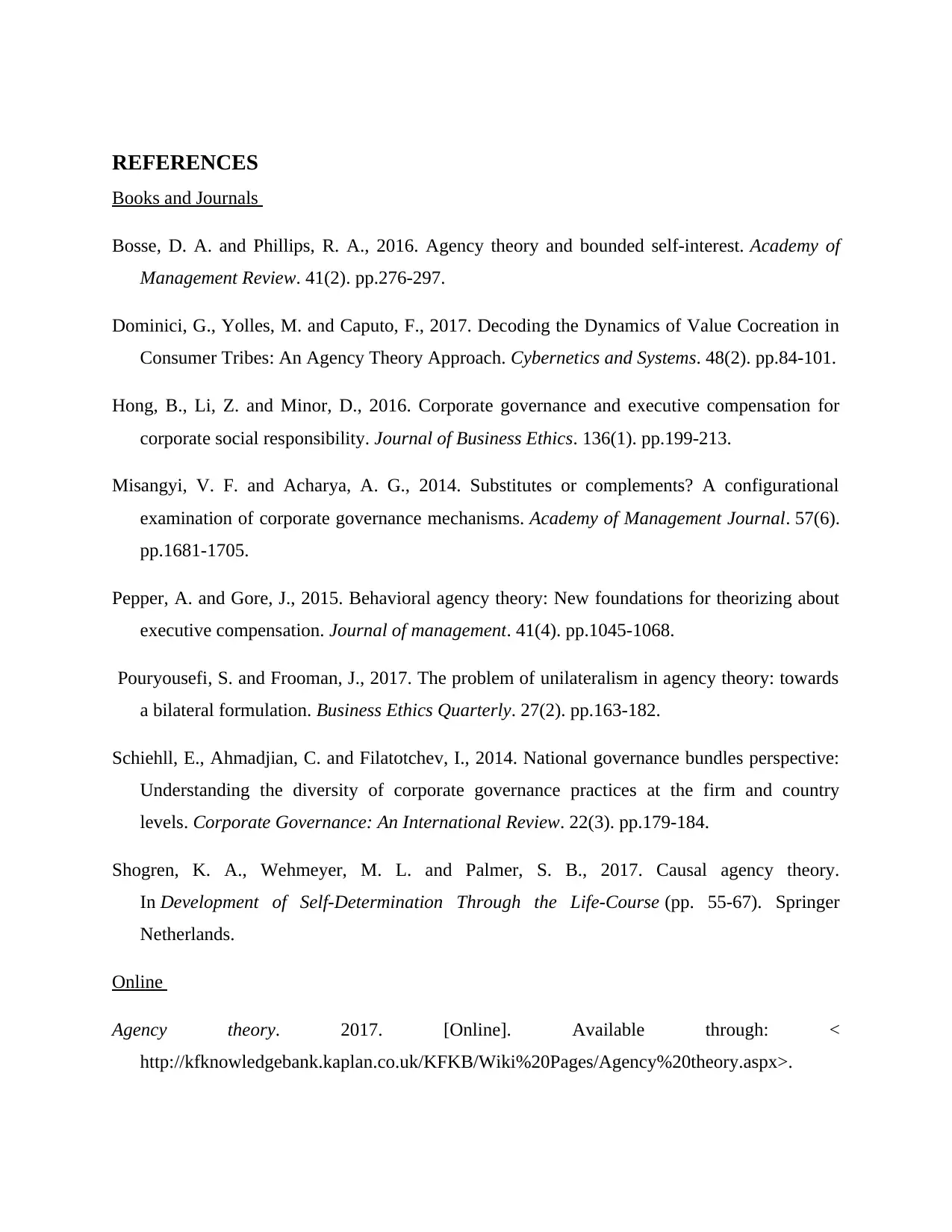
REFERENCES
Books and Journals
Bosse, D. A. and Phillips, R. A., 2016. Agency theory and bounded self-interest. Academy of
Management Review. 41(2). pp.276-297.
Dominici, G., Yolles, M. and Caputo, F., 2017. Decoding the Dynamics of Value Cocreation in
Consumer Tribes: An Agency Theory Approach. Cybernetics and Systems. 48(2). pp.84-101.
Hong, B., Li, Z. and Minor, D., 2016. Corporate governance and executive compensation for
corporate social responsibility. Journal of Business Ethics. 136(1). pp.199-213.
Misangyi, V. F. and Acharya, A. G., 2014. Substitutes or complements? A configurational
examination of corporate governance mechanisms. Academy of Management Journal. 57(6).
pp.1681-1705.
Pepper, A. and Gore, J., 2015. Behavioral agency theory: New foundations for theorizing about
executive compensation. Journal of management. 41(4). pp.1045-1068.
Pouryousefi, S. and Frooman, J., 2017. The problem of unilateralism in agency theory: towards
a bilateral formulation. Business Ethics Quarterly. 27(2). pp.163-182.
Schiehll, E., Ahmadjian, C. and Filatotchev, I., 2014. National governance bundles perspective:
Understanding the diversity of corporate governance practices at the firm and country
levels. Corporate Governance: An International Review. 22(3). pp.179-184.
Shogren, K. A., Wehmeyer, M. L. and Palmer, S. B., 2017. Causal agency theory.
In Development of Self-Determination Through the Life-Course (pp. 55-67). Springer
Netherlands.
Online
Agency theory. 2017. [Online]. Available through: <
http://kfknowledgebank.kaplan.co.uk/KFKB/Wiki%20Pages/Agency%20theory.aspx>.
Books and Journals
Bosse, D. A. and Phillips, R. A., 2016. Agency theory and bounded self-interest. Academy of
Management Review. 41(2). pp.276-297.
Dominici, G., Yolles, M. and Caputo, F., 2017. Decoding the Dynamics of Value Cocreation in
Consumer Tribes: An Agency Theory Approach. Cybernetics and Systems. 48(2). pp.84-101.
Hong, B., Li, Z. and Minor, D., 2016. Corporate governance and executive compensation for
corporate social responsibility. Journal of Business Ethics. 136(1). pp.199-213.
Misangyi, V. F. and Acharya, A. G., 2014. Substitutes or complements? A configurational
examination of corporate governance mechanisms. Academy of Management Journal. 57(6).
pp.1681-1705.
Pepper, A. and Gore, J., 2015. Behavioral agency theory: New foundations for theorizing about
executive compensation. Journal of management. 41(4). pp.1045-1068.
Pouryousefi, S. and Frooman, J., 2017. The problem of unilateralism in agency theory: towards
a bilateral formulation. Business Ethics Quarterly. 27(2). pp.163-182.
Schiehll, E., Ahmadjian, C. and Filatotchev, I., 2014. National governance bundles perspective:
Understanding the diversity of corporate governance practices at the firm and country
levels. Corporate Governance: An International Review. 22(3). pp.179-184.
Shogren, K. A., Wehmeyer, M. L. and Palmer, S. B., 2017. Causal agency theory.
In Development of Self-Determination Through the Life-Course (pp. 55-67). Springer
Netherlands.
Online
Agency theory. 2017. [Online]. Available through: <
http://kfknowledgebank.kaplan.co.uk/KFKB/Wiki%20Pages/Agency%20theory.aspx>.
1 out of 8
Related Documents
Your All-in-One AI-Powered Toolkit for Academic Success.
+13062052269
info@desklib.com
Available 24*7 on WhatsApp / Email
![[object Object]](/_next/static/media/star-bottom.7253800d.svg)
Unlock your academic potential
Copyright © 2020–2026 A2Z Services. All Rights Reserved. Developed and managed by ZUCOL.





